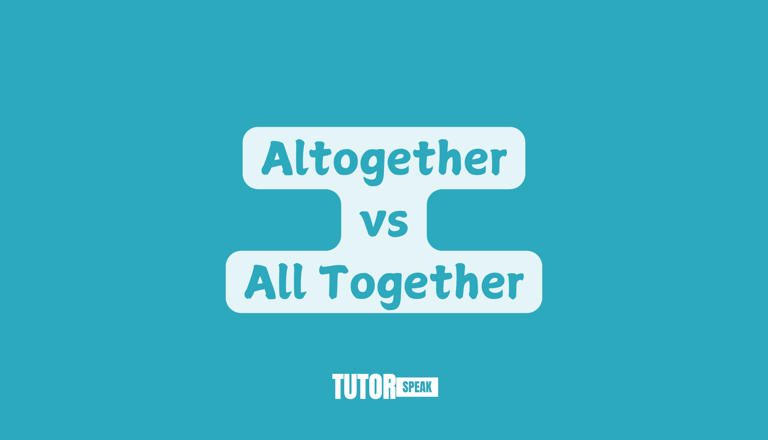Altogether vs. All Together: Understanding the Difference
The terms "altogether" and "all together" sound the same but have different meanings and uses in English. Here's how to distinguish between them:
TutorSpeak
12/18/20242 min read


Altogether vs. All Together: Understanding the Difference
The terms "altogether" and "all together" sound the same but have different meanings and uses in English. Here's how to distinguish between them:
1. Altogether
"Altogether" is an adverb that means "completely," "entirely," or "in total." It is used to emphasize the entirety of something or to summarize.
Uses of "Altogether":
To mean completely:
Example: "I am altogether happy with the results."
To sum up or in total:
Example: "There were five students absent altogether."
To express overall consideration:
Example: "The movie was altogether enjoyable despite its flaws."
Key Tip: If you can replace it with "completely" or "in total," use "altogether."
2. All Together
"All together" is a phrase that means "in a group" or "all at the same time." It refers to people or things being gathered in one place or performing an action simultaneously.
Uses of "All Together":
To mean everyone or everything in one place:
Example: "We were all together for the family reunion."
To mean doing something at the same time:
Example: "They shouted all together during the concert."
Key Tip: If the sentence makes sense when "all" and "together" are separated, use "all together."
How to Remember the Difference
Altogether = Completely or in total (a single word for a single concept).
All Together = Refers to a group of people or things acting or being united.
Examples for Clarity
"The idea was altogether ridiculous." (Completely ridiculous.)
"We were all together in the same room." (Everyone in one place.)
"There are ten pieces of cake altogether." (In total.)
"Let's sing all together now." (At the same time.)
Exercises (Without Answers)
A. Choose the correct option (altogether or all together):
The weather was ________ perfect for a picnic.
The students were ________ in the auditorium for the meeting.
It’s ________ possible that we might finish the project early.
Let’s gather ________ to discuss the plans for the weekend.
The performance was ________ amazing despite the technical issues.
B. Rewrite the sentences using "altogether" or "all together":
The family was united in one place for the first time in years.
The suggestion to cancel the event was completely unreasonable.
The team worked at the same time to finish the task.
In total, there were five errors in the report.
The group of friends decided to travel in one car.
C. Fill in the blanks:
The decision to cancel the event was ________ unexpected.
The hikers stayed ________ during the storm to keep safe.
There were ten people in the room ________.
The show was ________ worth the money.
We’ll start the game ________ as soon as everyone is ready.



